If only dogs could talk. It’s perplexing to us humans when they suddenly start acting strange.
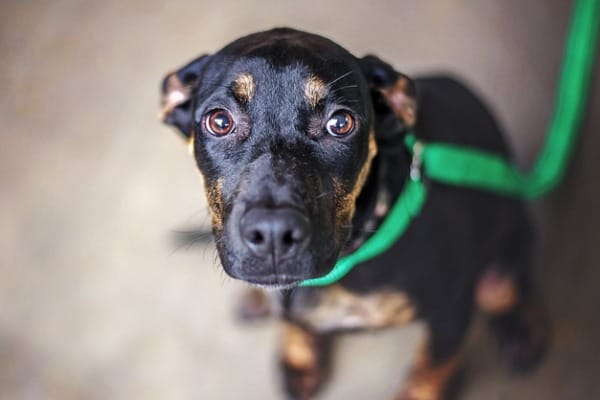
When your dog is acting scared out of the blue, you understandably want to know why.
While dogs can’t talk in human languages, they can communicate with us in other ways about their health and how they feel.
It might take some investigating to understand the source behind your pet’s change in behavior.
After all, they typically spend more time in our homes than we do ourselves.
But figuring out what’s making your dog scared isn’t impossible, and once you can understand what’s bothering them, you can take steps to make them feel comfortable in their home again.
Your pet acting scared might feel like a complicated issue and a stressful one.
We’ll take a look at the usual suspects and how to help your beloved pet.
If you’re asking yourself, “why is my dog afraid all of a sudden,” remember that dogs are rarely afraid without a reason to be – you have to dig a little deeper into the life of your pet.
Is Your Dog Scared of Certain Areas?
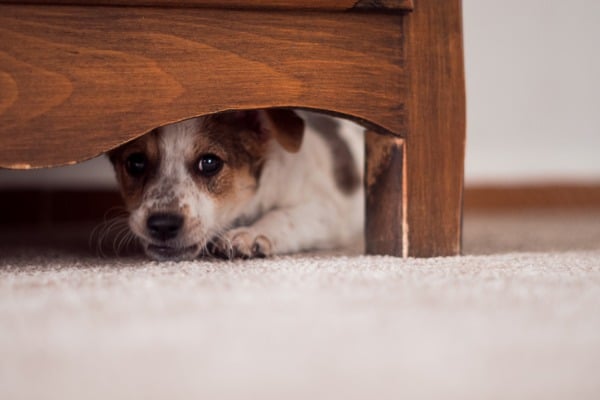
Has your dog started treating a particular room like room 237 from The Shining?
Sometimes, a dog will suddenly avoid a room they liked previously.
In the absence of security cameras, we can’t really know for sure what is making your dog scared of a certain area in the house, but it is possible to narrow down what could be the root cause of their abrupt change in behavior.
The Kitchen
Most dogs love hanging out in the kitchen – it’s the source of a lot of yummy smells.
It’s also a room where food is most likely to be dropped on the floor, every dog’s dream.
But not all smells are good for dogs. Burned dinners can upset some dogs, as can the sight of smoke and steam.
It’s impossible to pinpoint which dogs will be upset by smoke and steam – it all depends on their personality and past experiences.
Breeds prone to nervousness might be easily upset by scorched meals.
We recall a case where an adolescent German Shepherd made the mistake of jumping up on the stove and inadvertently turning on a burner that had leftovers on it.
Pans were burned, and smoke alarms were activated; it was traumatic for everyone involved.
That same dog would flee the kitchen each time she saw her people go near the stove – but at least she never had the urge to jump on it again.
Was it the smoke or the loud smoke alarm that she associated with the stove?
Unpleasant smells are enough to deter a dog from coming into the kitchen, but a smoke alarm is certainly upsetting.
Dogs with curved, upright ears will find sounds especially loud or even painful.
Odds are, if the smoke alarm is going off, you’re going to need some stress relief too!
A dog will associate the sound with confusion, panic, and overall bad time.
If a dog is suddenly avoiding the kitchen, think back: were there any cooking mishaps that they witnessed?
Smoke alarms aren’t the only loud noise that comes from the kitchen.
Think about blenders, mixers, and other kitchen appliances that might be bothering your dog.
The Bathroom
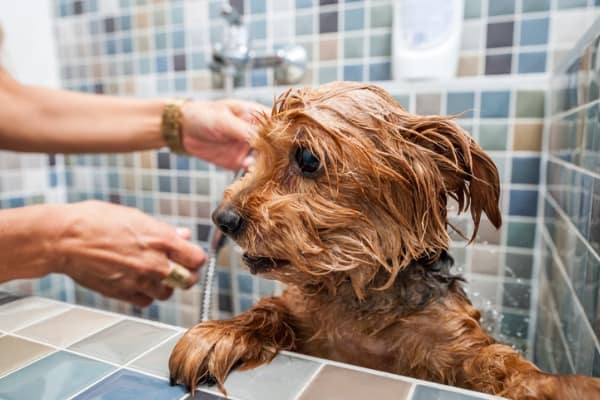
This is a pretty easy one to figure out if your dog has been given a bath lately.
Bath time isn’t fun for some dogs, so they might be hiding from the place they associate with being washed.
Is it a struggle to get your dog through the bathroom door when it’s bath time?
If the answer is yes, then they likely won’t go into the room of their own accord.
The bathroom can also be a source of some harsh smells. We use bleach, heavy-duty cleaning substances, and all sorts of hair sprays and perfumes in the bathroom.
Dogs might display fear towards smells that are harsh to them.
Chemical smells will seem unnatural, and they won’t be able to understand the source – so they could react fearfully.
The Bedroom/Living Room
Wherever your furbaby sleeps should feel like a safe space.
It’s puzzling if they suddenly avoid it. The fact is, most dogs spend a lot of time alone in our homes.
During those hours we’re at work, a lot of things can happen at home. They might seem like silly things to us, but to a dog, it could be scary.
Do you need to use the stairs to access the area? Your dog could have taken a tumble climbing up or down – they might be avoiding the stairs, not the room.
Dogs can be clumsy – they don’t understand that sometimes things fall over because they bumped into it, and they don’t understand that sometimes things just randomly fall.
The source of your dog’s anxiety could be as simple as they bumped a table and a book fell onto them.
If you come home and a picture frame has come off the wall, don’t be surprised if your dog is wary of that area of the house for a while.
Something heavier falling on them, like a baby gate, could seriously spook your pup. It’s possible they were running around and caused something like a trashcan to fall onto them.
Sometimes, your dog can get stuck or caught on something.
We’re reminded of another case of a Golden Retriever who got her tail tangled up in a deck chair – dogs can get snagged on the strangest things.
Be cautious about leaving collars on furbabies when they’re alone – make sure the collar can’t tighten if it were to get snagged on something.
Breakaway collars are the safest option if you leave one on your dog while unattended.
Behind Closed Doors
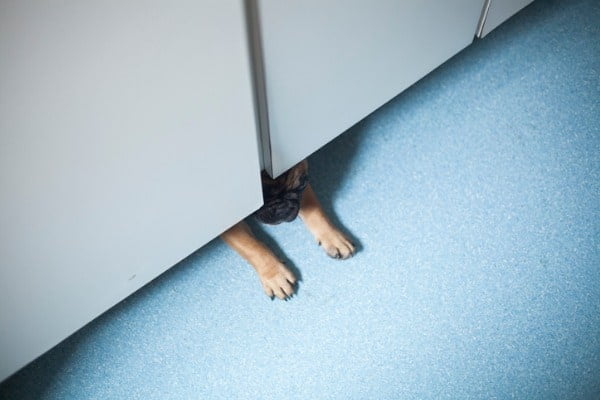
Feeling trapped could be enough to make your dog avoid a room.
While limiting their free reign of the house is sometimes necessary, keeping them shut in one room for too long can cause them to dislike it.
If your pet has earned privileges to roam the whole house, avoid shutting them in one place. Leave doors ajar, so they can wander as they please.
If they don’t have such privileges, consider crate training overlocking them in a bathroom or laundry room when you’re away.
A crate can become their safe space and a spot they feel secure.
Ways to Overcome Fears
Installing cameras in your home might be the answer if you’re unsure why your dog is suddenly afraid of one area of the house.
There could be several things happening at home while you’re away, causing your dog distress.
Once you can pinpoint why your dog is afraid of a certain area, try to eliminate the cause as best you can.
If it’s something your dog routinely knocks over, secure it, or move it where they can’t bother it.
The bathroom and kitchen can be a little tricky. We can’t avoid cooking, and we certainly can’t stop bathing our dogs when they need it.
The trick is a positive association. You can retrain your dog to associate these areas with good things.
Tasty treats and favorite toys are the best weapons in your arsenal.
Coax your dog into these rooms so they can have these things – not baths – and eventually, they will view the room as a less scary place.
My Dog is Suddenly Scared of Me
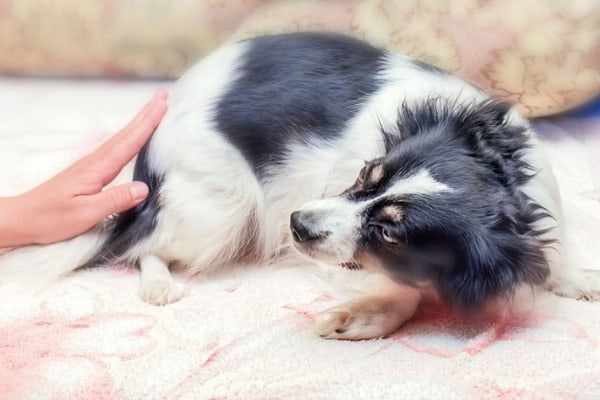
It’s upsetting if your dog seems fearful of you for no reason. Even if you treat them like royalty, they could be scared of you for other reasons.
It could be a small issue, or it could be a deeper one that requires a more complex solution.
The good news: dogs are forgiving. Whatever the reason, it’s nearly always fixable.
You Stepped on Them
We’ve all done it, and we all hate ourselves when it happens.
Stepping on dog’s toes and hearing that subsequent yelp is enough to break our hearts.
What do you usually do when that happens? Do you get down on the floor and apologize to them profusely?
It might seem silly, but science suggests dogs actually can understand our apologies.
The key thing to remember is that dogs might think we stepped on them purposely because we’re angry at them.
Apologizing to your dog starts with letting them know they didn’t do anything wrong – and we’re not angry with them.
Avoid speaking to them in panicky tones, even if you’re feeling terrible about yourself right now.
Talk to them in soothing, calm volumes. Tell them “good boy” or “good girl” – they need to understand they’re not in trouble.
Most dogs will understand and accept your apology as soon as they realize you’re not mad at them. They will lick or offer a paw to say, “Apology accepted.”
Don’t be surprised if your dog seems wary of you for a while, even if they do forgive you.
Being stepped on hurts, and they’ll want to avoid it.
Try not to take it too personally. Dogs are good at forgiving and forgetting.
You’re Using the Wrong Training Methods
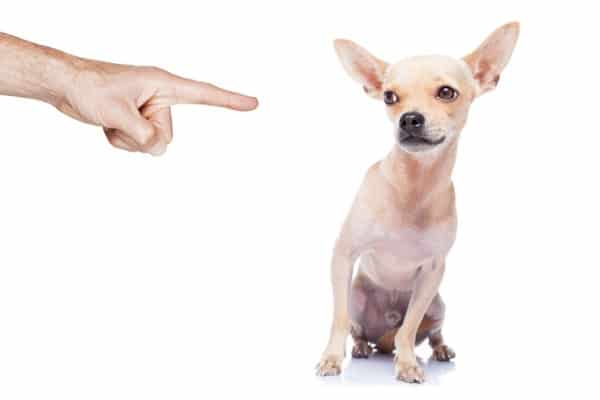
It should go without saying – dogs will become fearful if they’re mistreated.
Even in training, never hit or yell; this does more bad than good.
Some wives say the family dog will sleep on them and not their husband. Many factors could contribute to this, including how they are treated in general.
A relationship between a dog and their human needs trust. Every time you strike your dog or scream at them, trust will deteriorate.
These “training” methods are quite useless, anyway. Yelling at a dog because they had an accident will only teach them to fear you.
Avoid raising your voice or using angry tones when your dog has misbehaved.
And never rub your dog’s nose in their waste if they have an accident – it’s a good way to teach your dog to eat their own excrement.
The truth?
Dogs don’t understand punishment the way people do.
They have a hard time connecting punishment with whatever offense they committed – you have to catch them in the act for them to associate one with the other,
They respond much better to positive reinforcement, as you’ll see in this video:
Praise, praise, and praise your dog when they display wanted behavior (like using the bathroom outside).
Time-out can be an effective discipline method, especially in puppies.
Remember, you have to catch them in the act or immediately after for them to understand that they did a no-no.
Time-out is helpful because dogs are social creatures, and they want to be close to you and their pack if they have one.
A puppy caught chewing could be made to sit outside for five minutes to teach them it’s not acceptable behavior.
Redirection is another way to modify bad behavior. If the puppy is chewing a shoe, replace it with an acceptable chew toy.
While yelling isn’t recommended, a firm “no” is fine. Don’t get angry; just be strict.
They’ve Had a Traumatic Past
If your new dog or puppy is afraid of you, consider where they came from. Puppy mills and animal shelters are places where anxiety and stress run rampant among dogs.
And the sad truth about rescue dogs is that they often come from abusive homes. They could be terrified of all humans, not just you.
Building trust with any new pet is important, but it can present a challenge when the animal was previously mistreated.
Patience is vital when you’re building confidence with a rescue dog.
Never force your rescue dog to come near you – certainly don’t corner them. Give them time to see you aren’t going to harm them.
They can be overwhelmed at first, so take things slowly. Speak to them in a calm voice, even if they don’t want to come near you just yet.
Let them see you prepare their meals, and leave them treats and toys if they aren’t ready to accept from your hand yet. Offer your closed fist to their nose – not above their head – and let them sniff before you pet them.
Dogs are actually very good at communicating if you know what to look for. Nervous dogs will flatten their ears, tuck their tails between their legs, and yawn or lick their noses repeatedly.
They’re Only Frightened When You Do Specific Things
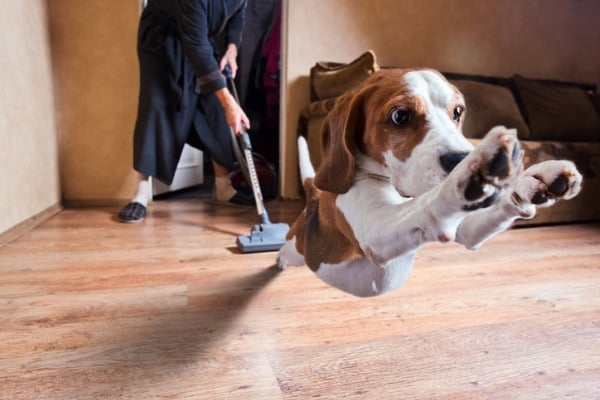
Most dogs hate the vacuum, so they might run away from you in fear when they see you get it out.
If they only knew you’re only vacuuming up all that hair, they leave everywhere.
Loud appliances like vacuums, hairdryers, blenders, or drills might make it seem like your dog is terrified of you., but in most cases, as soon as you put away the offending electronics, they will be their usual, lovable self.
What if your dog tucks its tail and hides when you reach for your keys or your purse? They could be suffering from separation anxiety.
Dogs associate things quite adeptly. The sound of the leash means it’s time for a w-a-l-k; the sound of the dog food container opening means dinner.
The same goes for things they don’t like. They will associate you gathering up your things or the garage door opening with you leaving for the day.
Plenty of dogs do just fine on their own, but some suffer from separation anxiety when you go out, even for short periods.
They might react by dragging out shoes or become destructive.
Whether the behavior is mild or extreme, the source is the stress they feel when they’re left behind.
No one wants to come home to chewed doors and wrecked kitchens, but your dog isn’t doing it because they’re punishing you for leaving.
On the contrary, acting out when you leave is their way of dealing with anxiety.
The first indicator is often them hiding when they realize you’re about to leave.
It might seem like your dog is afraid of you, but they’re really afraid of you leaving.
Separation anxiety can be hard to correct but not impossible.
You can teach your pet that leaving for a while doesn’t mean abandoning them.
Start by going through the motions of leaving; gather your keys, wallet, and purse as usual. Then go out the door for only a moment.
Repeat this, and slowly increase the time you spend outside. It can take some time, but it will teach your dog that you leaving doesn’t mean forever.
Tempting as it may be, try not to make a huge fuss when you leave.
We all like to tell our dogs bye for the day and promise them we’ll be back and we love them.
Embarking on a ten-minute goodbye ritual in a syrupy voice can increase their anxiety.
Speak to them normally; you can still tell them bye, but do it the same way you would your spouse or roommate.
“Oh, goodbye, Gidget! Mommy loves you so much, and she is so sorry she is leaving, but she promises she’ll be back soon, be a good girl”, followed by lots of cuddles, is not doing the dog any favors.
Try something like, “See you soon, Gidget, love you,” as you walk out the door.
Toss them a treat as you leave – it will help them associate your leaving with good rather than stress.
As you’re training your furry bundle of joy to become less stressed, they might cry or howl as you put the door between you.
Avoid rushing back in as soon as you hear them – this is only teaching them that their unwanted behavior will get them their way.
It’s not always easy, but you can train them not to be fearful of your leaving-the-house rituals.
General Fear
Your dog might not be acting scared of you or specific rooms but scared in general.
There are several possibilities to explore when this is the case.
They’re Ill or Injured
Dogs can’t talk – but they can still communicate. A dog that seems frightened might be trying to tell you they’re not feeling well.
Look out for other nervous behaviors, such as pacing, or hiding.
If your dog is suddenly displaying these symptoms without a clear cause, a call to your vet is the next step.
Injuries and illnesses often have no apparent symptoms, like a limp or a cut.
A dog may react in fear to an upset stomach or other internal ailments.
They Hear Something We Can’t
Dogs can hear different frequencies than humans can. They could be hearing something that is otherwise inaudible to us.
If the sound is new or irritating, it could make your dog nervous and scared. It can be hard to narrow down what the sound is, so the first thing to do is to consider any changes in the environment.
Do you have new neighbors? Is there construction going on in the area? Did you recently buy a new appliance? All could be sources of noises that are frightening your pet.
There’s New Family or Guests in the House
Whether it’s a new puppy, baby, or visiting relatives, dogs can become upset by strangers in their home. Some dogs adapt to change quickly, while others need time to adjust.
New pets and babies upset the balance that dogs are used to. Schedules may change, and your pet might need to share things they’re used to having to themselves – including your attention.
It’s essential not to force your dog into adapting – let them ease into it, even if that means they want to hide in their crate at first. Most dogs will come around with your help and gentle encouragement.
Introduce new family members slowly. Take the lead from them; if they’re showing fear, then give them a break – there’s no need to rush things.
As always, give them as much love and attention as you can spare. As soon as they realize they’re not being replaced, they’ll come around to the new puppy or baby.
Houseguests can be a little tricky to deal with since they’re (hopefully) not a permanent addition to the home. Some dogs will warm up fast, while others simply want to be left alone.
A weekend might not be enough time for a dog to warm up to someone, and honestly? That’s okay – especially if they’re infrequent visitors.
As long as they aren’t aggressive, giving them space until the guest leaves is the best option for everyone involved. For some dogs, it’s too much to ask for them to make friends with someone in 48 hours.
And let’s be real: when your dog tucks its tail and hides the moment your mother-in-law walks in, can you really blame them?
Calm Dog, Happy Home
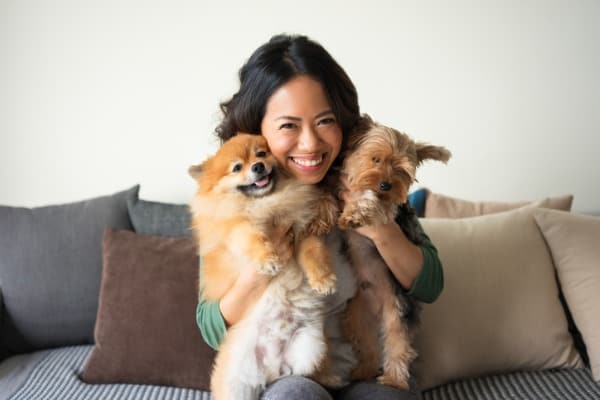
Dogs aren’t as different from us as some people think. If your wondering, “why is my dog is suddenly scared of me?” You might have accidentally stepped on him or her
If your asking yourself, “why is my dog scared all of a sudden” or “why is the dog acting scared?” They could be apprehensive about entering certain rooms or doing certain things based on past experiences.
The closer the bond with your dog, the easier it will be to understand their source of fear. And knowing is half the battle.
Once you nail down the reason your best friend is frightened, you can take measures to help them relax.
Remember that dogs react very well to patience, kindness, and gentleness. Make these a priority, and they’ll thank you for it.
